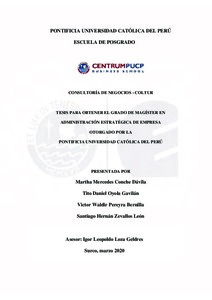| dc.contributor.advisor | Loza Geldres, Igor Leopoldo | |
| dc.contributor.author | Conche Dávila, Martha Mercedes | |
| dc.contributor.author | Oyola Gavilán, Tito Daniel | |
| dc.contributor.author | Pereyra Bernilla, Victor Waldir | |
| dc.contributor.author | Zevallos León, Santiago Hernán | |
| dc.date.accessioned | 2020-06-10T16:19:21Z | |
| dc.date.available | 2020-06-10T16:19:21Z | |
| dc.date.created | 2020-03 | |
| dc.date.issued | 2020-06-10 | |
| dc.identifier.uri | http://hdl.handle.net/20.500.12404/16417 | |
| dc.description.abstract | Coltur Perú, también conocida como Coltur, es una empresa privada peruana de
turismo cuyo negocio principal es ofrecer paquetes de viaje dentro del Perú a mayoristas y
minoristas. El propósito de esta consultoría de negocios es identificar los problemas y
planes que no le permitan a Coltur alcanzar sus objetivos. Como resultado de esta
investigación, se descubrió que el problema principal estaba relacionado al clima laboral
por una sensación de ausencia de liderazgo en la gestión de mandos medios lo cual se
opone a su objetivo de largo plazo en el cual Coltur mejorará su Índice de Satisfacción de
cliente en más del 95%. Después de efectuar reuniones con el CEO, los cuatro directores
de Coltur y algunos jefes y supervisores de mandos medios, se identificó que existen nueve
causas enlazadas al problema de clima laboral, las cuales son: i) la falta de identificación y
motivación en la empresa, ii) falta de objetivos compartidos y lineamientos de metas
compartidas, iii) falta de programa de incentivos y evaluación de desempeño, iv) exceso de
rotación de empleados en la organización, v) falta de definición de funciones y estructura,
vi) falta de comunicación, vii) falta de herramientas, viii) poca claridad en la línea de
carrera, ix) medición de clima adaptativo, x) exceso de carga laboral, xi) falta de
comunicación. Posteriormente, en base a las causas raíz se llegó a la conclusión que se
debían desarrollar las siguientes alternativas de solución: a) clima laboral, b)
compensaciones y beneficios, c) liderazgo, d) cultura, e) desempeño organizacional. De
esta manera, se utilizó la metodología design thinking que permitió analizar los resultados
de manera colaborativa alineado con la estrategia de negocio. Finalmente, se desarrolló el
plan de implementación, los resultados esperados, al igual que las recomendaciones y
conclusiones de la consultoría. El desarrollo de esta tesis se realizó antes del impacto del
COVID-19 en el mundo, por lo que el análisis y plan de implementación se enfocan en el
problema principal que no está asociado a esta coyuntura. | es_ES |
| dc.description.abstract | Coltur Peru, also known as Coltur is a Peruvian private company that attends
wholesalers and retailers with updated Peruvian travel packs to be offered worldwide. The
purpose of this business consulting was to identify the main problem that does not let
Coltur reach their objectives, assessing the main cause and offering a plan that let them
thrive. As a result of this research, it was found that the main problem was a poor
organizational climate and lack of leadership in the middle level of management which is
opposed with their main long-term objective that Coltur will improve their Customer
Satisfaction index by more than 95%. After conducting meetings with the CEO, the four
directors of Coltur and some chiefs and supervisors of middle managers, it was identified
that there are nine causes linked to the organizational climate problem, which are: i) the
lack of identification and motivation in the organization , ii) lack of shared objectives and
shared goals guidelines, iii) lack of incentive program and performance evaluation, iv)
excess employee turnover in the organization, v) lack of definition of functions and
structure, vi) lack of communication, vii) lack of tools, viii) poor clarity in the career line,
ix) adaptive climate measurement, x) excess workload, xi) lack of communication.
Subsequently, based on the root causes, it was concluded that the following solution
alternatives should be developed: a) work environment, b) compensation and benefits, c)
leadership, d) culture, e) organizational performance. In this way, the design thinking
methodology was used that allowed us to analyze the results in a collaborative way aligned
with the business strategy. Finally, the implementation plan was developed, the expected
results, as well as the recommendations and conclusions of the consultancy. This thesis has
been elaborated previously to the COVID-19 pandemic which is affecting the world, that’s
why the analysis and implementation plan are focused in the main problem not related to
this situation. | es_ES |
| dc.language.iso | spa | es_ES |
| dc.publisher | Pontificia Universidad Católica del Perú | es_ES |
| dc.rights | info:eu-repo/semantics/closedAccess | es_ES |
| dc.subject | Empresas--Perú | es_ES |
| dc.subject | Consultoría | es_ES |
| dc.subject | Sector turismo--Perú | es_ES |
| dc.subject | Servicios turísticos | es_ES |
| dc.title | Consultoría de negocios - COLTUR | es_ES |
| dc.type | info:eu-repo/semantics/masterThesis | es_ES |
| thesis.degree.name | Maestro en Administración Estratégica de Empresas | es_ES |
| thesis.degree.level | Maestría | es_ES |
| thesis.degree.grantor | Pontificia Universidad Católica del Perú. CENTRUM | es_ES |
| thesis.degree.discipline | Administración Estratégica de Empresas | es_ES |
| renati.advisor.dni | 41529143 | |
| renati.author.dni | 45897094 | |
| renati.author.dni | 44946938 | |
| renati.author.dni | 41509802 | |
| renati.author.dni | 42740242 | |
| renati.discipline | 413307 | es_ES |
| renati.level | https://purl.org/pe-repo/renati/level#maestro | es_ES |
| renati.type | https://purl.org/pe-repo/renati/type#tesis | es_ES |
| dc.publisher.country | PE | es_ES |
| dc.subject.ocde | https://purl.org/pe-repo/ocde/ford#5.02.04 | es_ES |





